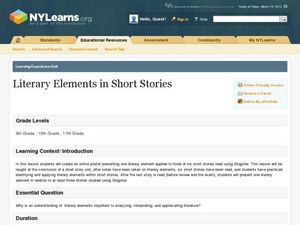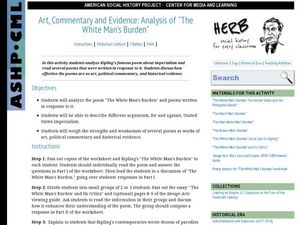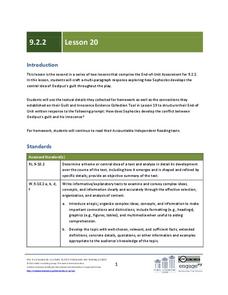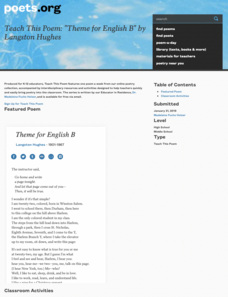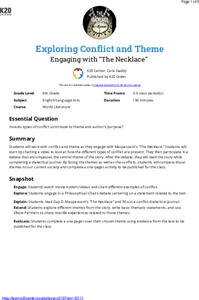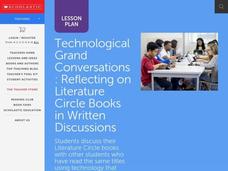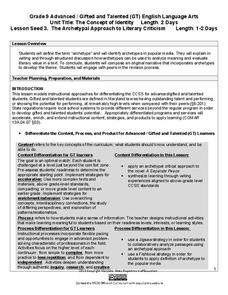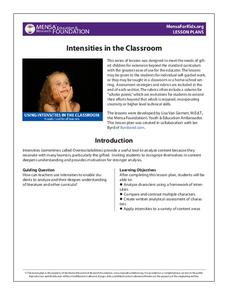Curated OER
Literary Elements in Short Stories
Introduce your class to Glogster with this literary analysis lesson. At the end of your short story unit, they choose one literary element to apply to three short stories and make an online poster using Glogster. Samples are included. If...
Curated OER
Art, Commentary and Evidence: Analysis of "The White Man's Burden"
A cross-curricular lesson combines poetry and history for your middle and high schoolers. The class critically examines Kipling's poem, "White Man's Burden" as historical evidence of the Imperialist ideology popular during his time. The...
National Endowment for the Humanities
The Glass Menagerie: Key Themes
Using the list of expressionist techniques generated in the first lesson, groups analyze how Williams uses these techniques to develop one of the play's themes. The whole class then shares and discusses the examples they found where...
National Endowment for the Humanities
Themes in Lord of the Flies
William Golding's Lord of the Flies is the anchor text for a lesson that teaches readers how to distinguish between a literary topic and a literary theme. Using the provided worksheets, groups first chart some themes and propose a...
National Endowment for the Humanities
Theme Analysis in A Christmas Carol
Why does Charles Dickens have Ebenezer go from scrooge to light-hearted and generous? From "Bah, humbug!" to "God Bless Us, Every One!" After rereading Dickens' preface to A Christmas Carol, learners analyze quotations from the tale that...
K20 LEARN
Analyzing Literary Figures: Analyzing Literature
The author study gets an update in a research project designed for high schoolers. Scholars search for information about literary figures that connects them to their times, their works, their themes, and other writers. Researchers also...
K20 LEARN
Growing Themes
The theme of a work is not a single word! Rather it is a statement that reflects what a writer believes or wants readers to understand about a topic or subject. Here's a short, but powerful lesson plan that utilizes passages from The...
Curated OER
Magical Musical Tour: Using Music Lyrics to Teach Literary Elements
While music lyrics are often used to teach literary elements, the richness of this resource comes from the wealth of exercises, activities, and support materials provided in the packet. Although designed for gifted learners, the...
EngageNY
Grade 9 ELA Module 2, Unit 2, Lesson 20
Oedipus' lack of literal and figurative vision does not mean he cannot see his guilt in the terrible fates of Laius, Jocasta, and all the lives touched by prophecy. Conclude a literary analysis unit on Sophocles' Oedipus the King with a...
EngageNY
Grade 9 ELA Module 1, Unit 1, Lesson 3
Just like in real life, characters in short stories show their true personalities through their words and deeds. Decipher the character development in Karen Russell's "St. Lucy's Home for Girls Raised by Wolves" with a set of activities...
Academy of American Poets
Teach This Poem: "Theme for English B" by Langston Hughes
Langston Hughes' "Theme for English B" is featured in a lesson that asks pupils to first read a biography of Hughes and list things about his life they think are important. The class then reads the poem and compares what they learned...
K20 LEARN
Exploring Conflict And Theme: Engaging With "The Necklace"
Teach young scholars how to determine the theme of a story, an insight the author wants to share with readers, with a lesson that uses Guy de Maupassant's "The Necklace" as an anchor text. Learners examine the internal and external...
K20 LEARN
We've Got Character! Literary Analysis: Characterization
How authors bring characters to life and make them believable is the focus of a lesson on characterization. Readers closely examine passages from To Kill a Mockingbird and Dreamland Burning, noting details that reveal the character's...
Curated OER
Technological Grand Conversations
Conduct a written literary discussion and diminish stress about public writing. Class members, already arranged into literature circles, compose and post responses to novels, signing with initials or class number. The process continues...
Brigham Young University
Introducing the Text and Learning the Process of Script Analysis
Where do directors and set designers get their ideas so that the set they build creates the mood and atmosphere the director wants for a production? From the script! Introduce theater high schoolers to the script analysis techniques used...
Maryland Department of Education
The Concept of Identity Lesson 3: The Archetypal Approach to Literary Criticism
As class members continue their study of approaches to literary criticism, readers examine the symbolism and archetypal patterns in John Knowles' A Separate Peace, and how these parallels are used to develop a theme in the story.
EngageNY
Grade 9 ELA Module 1, Unit 1, Lesson 9
Find the central idea in an excerpt from Karen Russell's "St. Lucy's Home for Girls Raised by Wolves" with a literary analysis lesson. As your class analyzes a section of the story, they determine how the author forms the central idea...
EngageNY
Grade 9 ELA Module 1, Unit 1, Lesson 10
As you work through a literary analysis unit based on Karen Russell's "St. Lucy's Home for Girls Raised by Wolves," use a writing assessment to measure your class's skills. They choose one epigraph from the story to analyze and track...
National Endowment for the Humanities
Practical Criticism
As an introduction to literary criticism, class members recreate I.A. Richards' close reading experiment. Individuals select a poem, paraphrase the story, focus on the imagery used, consider what the imagery adds to the tale, and...
K20 LEARN
I Theme, You Theme, We All Theme For Ice Cream: Themes In Literature
Teach readers how to distinguish between a topic and a story's theme in a short lesson that uses the children's book, Should I Share My Ice Cream, as an exemplar. After listening to the story, pairs generate a list of topics covered in...
Novelinks
Count of Monte Cristo: Concept/Vocabulary Analysis
Explore the complex themes of Alexandre Dumas' The Count of Monte Cristo with a concept and vocabulary analysis lesson plan. Lead your class in a discussion about the underlying social and historical issues surrounding the novel, as well...
MENSA Education & Research Foundation
Intensities in the Classroom
Everyone learns and experiences life differently. A set of lessons about character intensities encourages middle and high schoolers to analyze themselves, their peers, and characters from a book based on the five listed intensities:...
Curated OER
Characterization of Mice and Men
Using a SMART board presentation (provided), your class discusses the characterization of Lenny, George, Curley, Curley's wife, and the farmhands in John Steinbeck's Of Mice and Men. The presentation includes a list of traits for...
EngageNY
Grade 9 ELA Module 2, Unit 2, Lesson 2
Continue a thoughtful analysis of Sophocles' Oedipus the King by discussing the importance of dialogue within the play's structure. Ninth graders examine how Oedipus speaks about himself to his subjects and Creon before recording their...
Other popular searches
- Literary Analysis Plot
- Literary Analysis Paper
- Literary Analysis for Poetry
- 9th Grade Literary Analysis
- Literary Analysis on Quotes
- Writing Literary Analysis
- Literary Analysis the Hobbit
- Test for Literary Analysis
- Literary Analysis Pocahontas
- Writing a Literary Analysis
- Literary Analysis Essay
- Literary Analysis Plays


